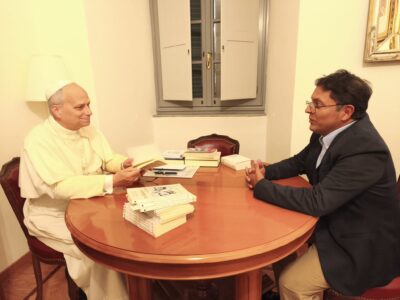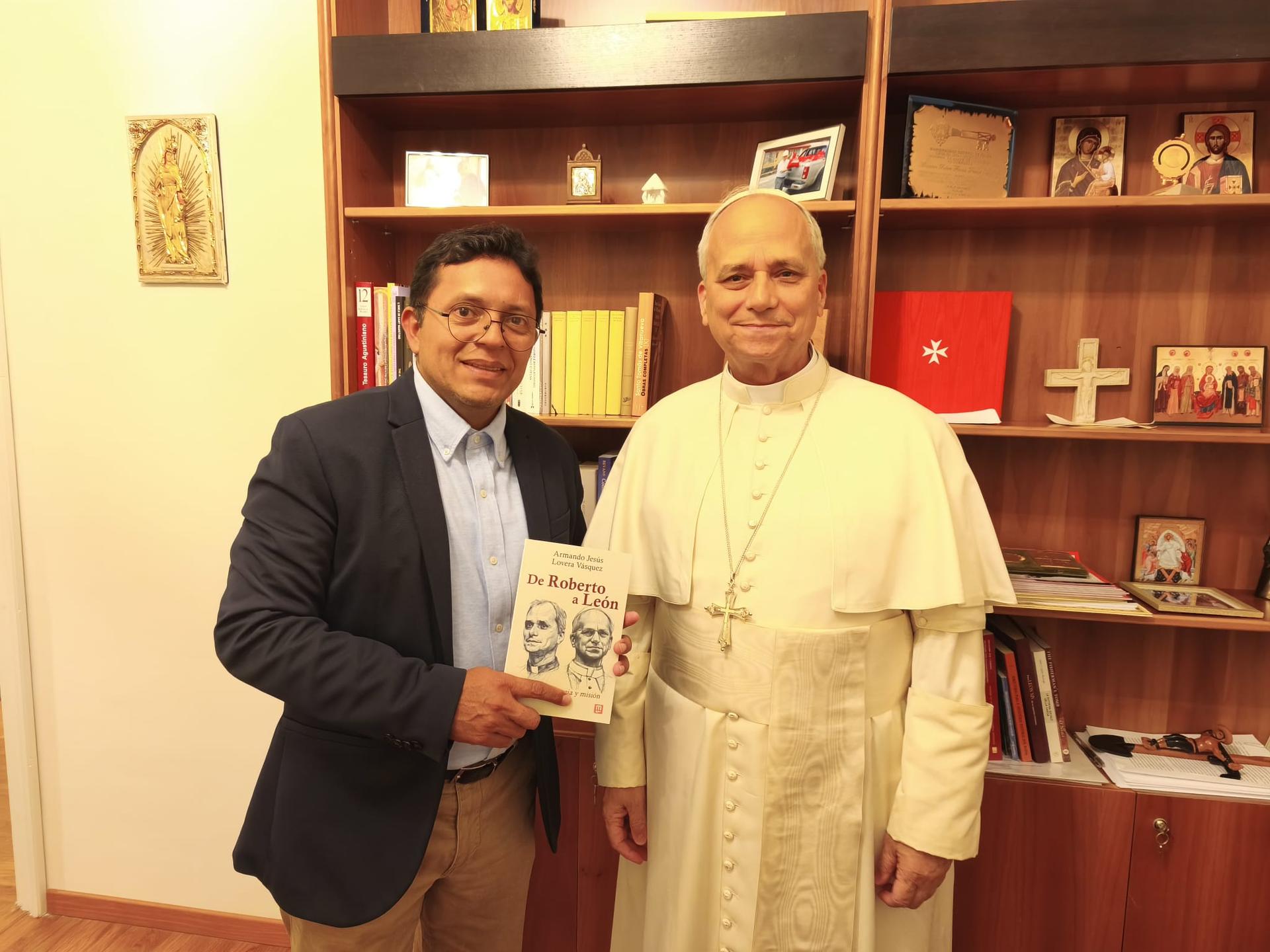ROME – A new book painting a deep and intimate portrait of the longstanding friendship between Pope Leo XIV and one of his closest friends offers new insights into the pontiff and points to authentic friendship as a remedy for a polarized world.
Speaking during a recent presentation of his Spanish-language book, “Da Roberto a Leon” (From Robert to Leo), Armando Jesús Lovera Vásquez said that “Friendship is fundamental to humanity. It is key to human life” and is able “to build new bridges (and) heal wounds. There is a lot to share.”
Lovera, a former Augustinian who met then-Father Robert Prevost in 1991 and refers to the pope as his amigo de alma, said that friendship according to Augustinian spirituality is a “place of encounter (and) immense joy.”
In a brief introductory comment for the book, Pope Leo himself quoted his speech for a vigil event during the Jubilee of Young People over the summer in which he stressed the importance of friendship with Christ as the basis of faith.
“Friendship with Christ, which forms the basis of faith, is not just one aid among many others for building the future; it is our guiding star,” Leo said, saying, “love one another! Love one another in Christ! Know how to see Jesus in others. Friendship can truly change the world. Friendship is a path to peace.”

Augustinian Father Juan Antonio Cabrera Montero, who offered an extended reflection on the Augustinian notion of friendship during the Rome presentation of the book, said that authentic friendship is something that the modern world has lost, and that it is “a vocation of the church, a way of building living communities where bonds are neither power nor convenience.”
“It is a source of mission, because friendship is open to God and the service of humanity. It is a gift, it humanizes and divinizes us,” Cabrera said, saying there is a need to “recover the true meaning of humanity, of Christ’s experience with the disciples, and not only.”
Friendship is a deep experience and a school for life that offers a path forward amid division, he said, saying, “in a fragmented world, we must rediscover that friends not only accompany one another in time, but also guide one another to eternity.”
Published earlier this month with the Loyola Communications Group, the book is 171 pages and consists of 18 chapters recounting Leo’s experience of his election to the papacy, his Augustinian roots and the importance of friendship, as well as anecdotes about his friends and family, and his friendship with Lovera.
Lovera was born in Iquito, an Amazonian vicariate led by the Augustinians in Peru, and met the order there, deciding to pursue a missionary vocation. He entered the Tomás de Villanueva formation house in Trujillo, and it was there that he met then-Father Robert Prevost, who was his formator and who became a close friend.
During his Rome book presentation Lovera said that the most significant chapters of the book are the second chapter, recounting the pope’s acceptance of his election as an act of trust in God and his providence, as well as chapter 17, which offers a reflection on the pope’s parents, Louis and Mildred Prevost.
In the second chapter, Lovera recounts how after hearing Cardinal Dominique Mamberti pronounce the name “Robertum” from the balcony on the façade of Saint Peter’s Basilica, he knew instantaneously that it was his longtime best friend, Robert Francis Prevost.
“I felt a sharp edge cutting through my soul,” Lovera writes, saying he fell to his knees and began to weep, thinking about the moments they had shared together, as well as the new pope’s “know-how” of how to be with and be close to others.
Lovera reflected on how, just prior to being created a cardinal, then-Bishop Robert Prevost was asked what he liked to do in his free time.
Prevost’s response at the time, he said, was that he liked to read, walk, travel, and discover new places, but what he most enjoyed was “being with my friends. Meeting different people and learning about their gifts. This truly enriches me.”
The now-pope had said on that occasion that as an Augustinian, “living in community has been one of the greatest gifts of my life. Sharing what we’re going through, opening up to others, building together…that’s priceless. Discovering the gift of friendship leads us to Jesus himself. Having authentic friendship is beautiful. I believe it’s one of the greatest gifts God has given us.”
After getting in touch with his friend, the new pope, following his election, Lovera told Leo that he was considering writing a book about him, from the perspective of friendship, and the pope gave his blessing.
The goal of the book, then, Lovera said, was for people to see in the pope what he sees: “a friend who offers his friendship, and with it, the friendship of the one who gives meaning to life, Jesus.”
Lovera during the presentation described his friend Leo as “a very humble person” who is shy but highly intelligent and good with languages, and who always carries a sense of gratitude and is ready for the new mission entrusted to him as pope.
Leo, he said, is also someone who was close to Pope Francis and was pained by some of the criticism the Argentine pontiff faced and is someone who is stepping into the role as Francis’s successor with a lot of experience in governance and in building bridges with those who think differently.
As an example, Lovera noted that when the pope arrived in Chiclayo as its new bishop in 2015, he came after nearly 40 years of leadership by the more conservatively minded group Opus Dei and was “labeled as a progressive,” but ultimately led a diocese that was “very receptive and willing to collaborate.”
“He doesn’t destroy anything; he builds from what exists, and he does this with moments and spaces of listening. He wanted the doors of the bishopric to be open to everyone,” Lovera said, saying this can at times be frustrating and seen as a lack of action, but “the listening processes take time. We have to be bridges.”
Cabrera in his remarks on friendship said the pope’s formation in the Augustinian notion of friendship would be key not only to his personality, but also to his governance.
During his 12 years as prior general of the Augustinians, he said, Prevost “never acted like a distant sovereign or a bureaucrat. He always acted like a brother among bothers, with the responsibility of being superior and making decisions, but always reasoned.”
“Good governance is influenced by a sense of friendship. We relate to people we must love, with whom we must have a rapport,” Cabrera said, saying Leo’s governance style as pope, then, “will be a government centered on individuals.”
Follow Elise Ann Allen on X: @eliseannallen










